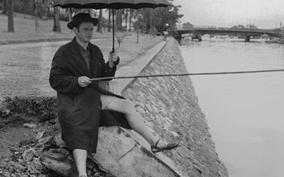
Let's start with the barometer. The barometer is a very effective tool for measuring the feeding behavior of fish. The barometer is an instrument used to measure ambient atmospheric pressure. Don't worry, I'm going to simplify it for you and cut through all of the scientific jargon so we can get to what really matters, catching fish. The measure of barometric atmospheric pressure can then be used to help predict the weather and more importantly for our purposes, the feeding behavior of fish. Haven't we all wondered why fish were so easy to catch yesterday, but today you can't even get a bite?
You see when a low pressure front is building, I'm sure you've all heard this term on the weather channel, the barometer is low and dropping and a storm is either present or on its way. When the barometer is high or rising, the weather is fair and dry. If you're watching the weather on the TV, that's what the large capital L or H means on the weather map. The L stands for a low pressure system and the H stands for a high pressure system.
So what does this mean to me as a fisherman? Let me explain. The barometer is a very useful tool that will unlock many of the "mysteries" of fishing. You say, "Come on Trevor, is this really true?" The answer is yes, it is true. When the atmospheric pressure fluctuates, it affects the air bladders in fish. A fishes' air bladder is what it uses to stabilize itself at different depths of water. When a fishes' air bladder isn't feeling right it won't want to eat. Do you feel like eating when you have an upset stomach? Well fish don't either.
When the barometer is low or falling, fish will spend most of their time equalizing their air bladder, and the last thing they're thinking about is feeding. When this happens you'll have a difficult time fooling a fish into eating. On the other hand, when the opposite is true, and the barometer is rising, your chances of catching a fish, is far greater, because they feel more like eating.
Fish and wild life know what to expect from the weather and can sense when a storm is approaching to a much greater degree than we humans can. You've probably noticed that when the weather is nice all of the critters outside are active and frolicking about. This means that the barometric pressure is stable or high. On the other hand when the barometric pressure is low, you won't see nearly as many animals around and the ones you do won't be frolicking anywhere. Even the cows in your local field will be lying down. At times like this it can get pretty quiet out on the lake or river too. The fish just aren't active.
Understanding how fish adapt to changes in their environment allow an angler to better predict a fishes' movement and feeding. Finding out when a fish is feeding is what we're interested in because that's when you have the best chance of catching said fish. You may know that almost all saltwater fishermen check the tides before they head out fishing. And it's a great strategy because the tides impact fishing. But you do realize what causes the tides to change, don't you? That's right, the moon. And the gravitational pull of the moon that impacts the changing tides is also pushing against some part of the earth all the time. So the pressure is always there but since water is more easily moved than the ground, water is lifted up towards the moon causing the tides to change. How high the high tide will rise or how low the low tide may go is largely determined by the position of the moon and sun.
Knowing and understanding this information isn't just important to the saltwater angler though. Freshwater anglers don't deal with tides like saltwater anglers, but the phases of the moon are very important to them as well. What the angler wants to focus on are the new moon and full moon periods on the calendar. The two or three days following these two occurrences will result in more fish activity. It's that simple.
I've been planning my fishing trips observing these same principles for years and it almost never fails. The moon phases are a very real factor in the feeding patterns of fish. I always have more success during the full and new moon periods, than I do at other times of the month and you can too.
What you as an angler wants to try to do is have both of these factors come together at the same time. The perfect weather situation combined with a full or new moon. When this happens, you will have a great day fishing, I promise. And if you just pay attention you can be out there fishing when this happens.
Trevor Kugler - Co-founder of JRWfishing.com Trevor has more than 20 years of fishing experience, and raises his three year old daughter in the heart of trout fishing country....Montana.
Check Out Our Boats and Pontoons: http://www.jrwfishing.com/boats.html
http://www.jrwfishing.com/sunglasses.html - Start Catching more fish Today!!!!
Sign up for the best free fishing Ezine on the web and get $10 for your trouble. - http://www.jrwfishing.com/signup.html
Article Source: http://EzineArticles.com/?expert=Trevor_Kugler
http://EzineArticles.com/?How-The-Weather-And-Moon-Really-Impact-Fishing&id=330950

